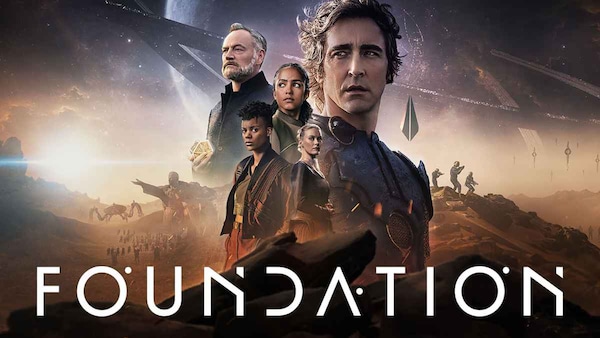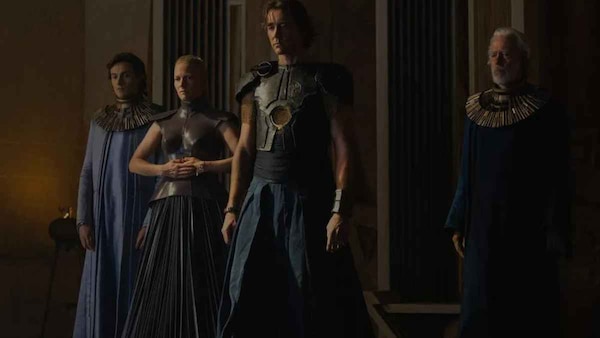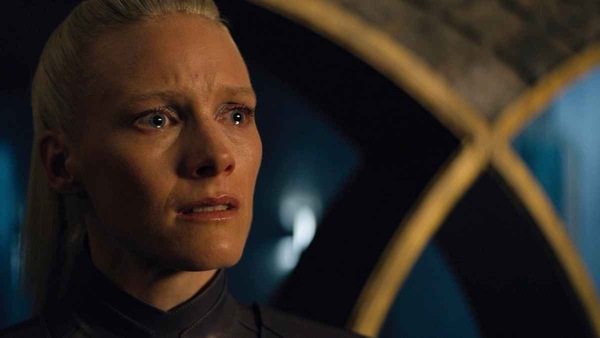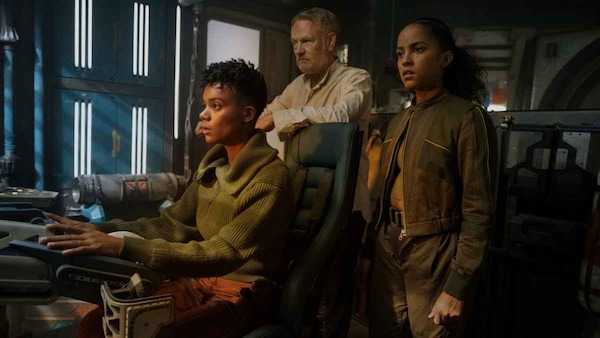Foundation season 2 review: A superior second season and a vastly different take on Asimov’s story
The creators of the Apple TV+ series have added more depth to Issac Asimov’s characters and lore, and they have delivered a captivating space opera

Last Updated: 09.51 PM, Sep 15, 2023
Story: There is uncertainty in the Galactic Empire seated in Trantor, as the ruler of the galaxy, the new Brother Day (Lee Pace), plans to end the Genetic Dynasty made up of the clones of Cleon over hundreds of years. He decides to wed Queen Sareth (Ella-Rae Smith) of the Cloud Dominion for this purpose. Elsewhere in the galaxy Gaal Dornick (Lou Llobell), Salvor Hardin (Leah Harvey), and a resuscitated Hari Seldon (Jared Harris) travel to a mysterious planet and come across a group of people known as the Mentalics – a faction who appear to have telepathic abilities. Despite the Mentalic matriarch Tellem Bond’s (Rachel House) warm hospitality, Hari suspects that she might be a threat to the Foundation and psychohistory itself.
Review: Foundation is probably one of the most underappreciated TV shows today. The same could be said about several Apple TV+ originals, apart from the multiple Emmy Award-winning comedy Ted Lasso. There can be no arguments that Apple has invested a lot of money and resources in several of its productions, with Foundation in particular, featuring stunning visuals and astounding production value. One could argue that Foundation dwarfs some of the major big-budget Hollywood films in terms of spectacle and sheer scale of the universe created by showrunners David S. Goyer and Josh Friedman. While they have certainly taken plenty of liberties from Issac Asimov’s iconic novels, some of the alterations have certainly added several rich layers to the pre-existing lore. The one major shift from Asimov’s novels that is certainly an intriguing and captivating improvement is the introduction of the Genetic Dynasty.

In the novels the Galactic Empire is merely an afterthought briefly mentioned in various points as most of the story is set in Terminus around the Foundation. However, in the TV series The Genetic Dynasty, the succession of clones of Cleon, is one of its pivotal storylines. And surprisingly, the subplot of the three clones of Cleon the First, the young Dawn (Cassian Bilton), the prime leader Day, and older Dusk (Terrence Mann), is arguably the most fascinating and alluring aspect of the series. Even the Empire’s immortal caretaker and right-hand, Demrazel, is a vital character, if not one of the most vital characters of the story – one who is probably just as significant as the galactic spirit himself, Hari Seldon. Laura Birn, who plays Demrazel, deftly switches between her cold and calculating persona as an omniscient-like robot, to a being who is burdened with the weight of responsibility of the Empire. She is also riddled with inner turmoil and is morally conflicted as her programming has stripped her away her free will, despite holding immense power over trillions of people across the galaxy.

There are a few narrative inconsistencies that could have been ironed out, but the performances by Lee Pace as Day, Jared Harris as Hari Seldon, Ben Daniels as Bel Riose, and of course Birn as Demrazel, overshadow any issues with the screenplay. The second season does take time to establish the narrative and character, just as in the case of the first season, but once all the pieces are set in place the series goes from strength to strength. Some of the core elements of Asimov's first book such as the union of science and religion, or in other words the Foundation using religion as a a tool to further scientific advancement and establishing order across the galaxy is one of the main plot lines of the series. While the series does lean on a vastly different approach to explore this aspect from Asimov’s original novels. Poly Verisof (Kulvinder Ghir), who plays a vital role in Salvor Hardin’s master plan to defeat the Anacreons in the novel, has a very different purpose and a more fleshed-out arc in the TV series. Similarly, Salvor Hardin also has a significantly different character arc when compared to her book counterpart. Unfortunately, Hardin’s subplot in the series has shackled both seasons one and two.

Hardin’s stint as the warden of Terminus in season one and then her eventual journey to Ignis with Gaal Dornick and Hari Seldon in season two is one of the few aspects of the TV series that holds it back from being revered as one of the best things on television this year. The writers could be forgiven to an extent for making Gaal Dornick a messianic figure (the antithesis of Asimov’s central theme about psychohistory), considering she is essentially a character in the first book written just as an audience surrogate who introduces the readers to Trantor. And just like her Salvor Hardin and Damrazel, Gaal is also gender-swapped for the series. Swapping genders for Gaal and Damrazel is inconsequential, or may have even been the right choice. However, for Hardin, gender-swapping the character meant subjecting drastic changes to the source material – ironically, to the only character Asimov considerably fleshed out in his story. Hardin in the novel eventually becomes a seasoned cigar-smoking politician who is renowned for his wit, diplomacy, and foresight to great effect. He often uses the quote; “Violence is the last refuge of the incompetent.” While this line does make it into the series thanks to Poly Verisof, albeit under very different circumstances, Hardin in the series follows a contrasting ideology. She is a little too trigger-happy and is considerably younger than her book counterpart.

Salvor Hardin’s arc will irk those who have read the original novels. However, the final episodes offer gripping set pieces that overshadow any deficiencies the series may have. Seldon’s plan to save the galaxy is finally taking shape and the Galactic Empire faces its first major crisis, while the Foundation faces its second.
Verdict: Foundation season 2 excels on several fronts, from captivating visuals to stellar performances by its cast. While it does take its time to settle and thoroughly explore the expansive world of the Galactic Empire, the final episodes of the season deliver the show’s very best. It remains to be seen if Apple will greenlight a third season, considering the production cost and the relatively low viewership figures. Regardless, the season finale shared a glimpse of what to expect from a potential third season.
WHERE
TO WATCH
Subscribe to our newsletter for top content, delivered fast.

